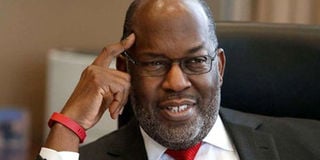Prime
How to become a better leader

Leaders are encouraged to develop the talents of the workers. PHOTO/COURTESY
What you need to know:
- Tip: When setting objectives, encourage employee questions and feedback. Including them in the process can increase engagement.
Learn how to be a good leader to improve your team’s engagement and success. Learning how to be a good leader can greatly impact the success of your team, your organisation and yourself.
Learn how to be a good leader to improve your team’s engagement and success. Learning how to be a good leader can greatly impact the success of your team, your organisation and yourself. To be an effective leader, you must understand your own motivations, strengths and weaknesses. Great leaders connect with their team by facilitating open communication, encouraging employee growth and development, and giving and receiving feedback.
Anyone can sit in a corner office and delegate tasks, but there is more to effective leadership than that.
Effective leaders have major impacts on not only the team members they manage, but also their company as a whole. Employees who work under great leaders tend to be happier, more productive and more connected to their organisation – and this has a ripple effect that reaches your business’s bottom line.
“I think a great leader is one who makes those around them better,” says Dana Brownlee, founder of Professionalism Matters. “There are many litmus tests for a great leader, but I really look to those around them: Are they growing, becoming better leaders themselves, motivated, etc.?”
If you look around and see that your team members have become disengaged or stagnant in their work, it may be time to reassess and reform your strategies. We spoke with CEOs, directors and leadership experts to learn what those leadership strategies are and how you can incorporate them.
Engage in honesty
One of the most important elements of effective leadership is creating an open line of communication with your team members. Sanjay Patoliya, the founder and director of Teclogiq, said that your own honesty and transparency should serve as an example for your team members.
“When you are responsible for a team of people, it is important to be straightforward,” he said. “Your company and its employees are a reflection of yourself, and if you make honest and ethical behaviour as a key value, your team will follow.”
Connect with your team members
Leading a group of people requires a mutual sense of trust and understanding between the leader and their team members. To achieve this, leaders should learn to connect.
Terry “Starbucker” St. Marie, a leadership writer and consultant, said that being a “more human” leader requires positivity, purpose, empathy, compassion, humility and love. These key traits will put you on the road to genuine connections with the members of your team.
“Building a real, personal connection with your teammates is vital to developing the shared trust necessary to build a strong culture of accountability and exceptional performance,” St. Marie said. “With that culture in place, the team can achieve a successful business, a happy team and a fulfilled leader.”
Encourage growth
Acting as your team’s cheerleader is an important part of being an effective leader. You should be invested in their success and growth.
Keri Ohlrich, the CEO of HR consulting company Abbracci Group, said that leaders should set aside a budget, if only a small one, to dedicate to the growth of their employees. “With options as varied as on-demand, virtual [and] in-person options, there’s ample opportunity to continue learning new skills or further developing existing ones,” she said. “Empower your employees to take the time to learn and infuse that in the work they do.”
In addition to investing in your employees’ growth financially, you should invest emotionally.
Do not give orders
An effective leader knows how to show others what is required, rather than simply telling them. Luke Iorio, president and CEO of the Institute for Professional Excellence in Coaching (iPEC), said leaders should coach their team members toward a more collaborative, committed work environment – without coaxing them.
“[If you are] controlling people to do certain things in certain ways, you are not going to get the level of engagement that you are looking for,” he said. “Coaching is about helping the people you lead recognise the choices they have in front of them. People will take a great deal of ownership over the direction of the project.”
As opposed to simply barking orders at team members, Rampton said that good leaders should encourage growth by teaching. “People would not grow if leaders never taught them anything. Leaders need to be teaching so they can grow new leaders to take their place.”
Source: Business News Daily





